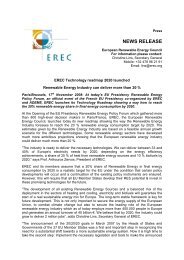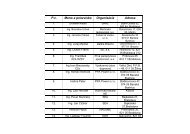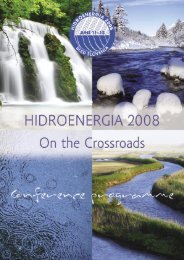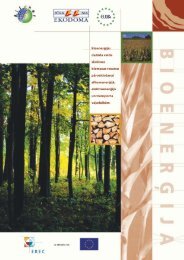EREC Position Paper on Biofuels - European Renewable Energy ...
EREC Position Paper on Biofuels - European Renewable Energy ...
EREC Position Paper on Biofuels - European Renewable Energy ...
Create successful ePaper yourself
Turn your PDF publications into a flip-book with our unique Google optimized e-Paper software.
now 26% higher than they were in 1990. <strong>Biofuels</strong>, together with increased transport efficiency, fuel<br />
efficiency and savings are at present the <strong>on</strong>ly immediately available and viable alternative to fossil<br />
fuels capable of reducing GHG emissi<strong>on</strong>s significantly and with immediate effect. <str<strong>on</strong>g>EREC</str<strong>on</strong>g> calls up<strong>on</strong> the<br />
EU decisi<strong>on</strong>-makers not to let the chance pass by to create a viable legislative envir<strong>on</strong>ment<br />
encouraging renewable energy soluti<strong>on</strong>s in the transport sector. Only the binding 10% target can<br />
establish a framework which enables Member States to deliver <strong>on</strong> using renewable fuels in this<br />
sector (and deliver <strong>on</strong> replacing fossil fuels in the transport sector).<br />
<strong>Energy</strong> security. At present, the EU is importing 98% of its transport fuel needs from third countries,<br />
most of which are located in politically unstable regi<strong>on</strong>s. The increasing world demand is pushing oil<br />
prices to historic maxima and <strong>on</strong>ly developing an alternative fuels market can compensate increasing<br />
oil costs and alleviate the oil bill. Domestic biofuel producti<strong>on</strong> has a big potential in reducing the<br />
EU’s heavy dependency <strong>on</strong> crude and fuel imports. In the wake of a looming peak in oil, leading oil<br />
companies are exploring more and more envir<strong>on</strong>mentally harmful crude from tar sand, shale and<br />
the deep sea. Specifically biofuels can help to cushi<strong>on</strong> the negative impact of this growing shortage.<br />
<str<strong>on</strong>g>EREC</str<strong>on</strong>g> would like to stress that sustainable biofuels produced in the EU can deliver a c<strong>on</strong>siderable<br />
c<strong>on</strong>tributi<strong>on</strong> to addressing this energy security c<strong>on</strong>cern in EU Member States.<br />
10% is part of the 20% target<br />
<str<strong>on</strong>g>EREC</str<strong>on</strong>g> applauds the Commissi<strong>on</strong>, which showed extreme diplomatic sensitivity in establishing the<br />
fragile equilibrium of nati<strong>on</strong>al targets for 2020. The 10% target is an essential, necessary part of the<br />
overall 20% target for renewable energy by 2020.<br />
10% binding target and sustainability – EU as a leading example for sustainable producti<strong>on</strong><br />
As the experience with the existing biofuels Directive shows, fuel distributors (oil companies) <strong>on</strong>ly<br />
use biofuels if there is an ec<strong>on</strong>omic advantage (fiscal incentive) or because they are forced to use<br />
them. Precisely the binding nature of the biofuel target has triggered the very important debate <strong>on</strong><br />
sustainability criteria and a certificati<strong>on</strong> scheme. Notwithstanding the fact that EU biofuel producers<br />
comply already today with the highest possible global farming standards, <strong>on</strong>ly the EU biofuel<br />
objective justifies the building of a sustainability and certificati<strong>on</strong> scheme. This scheme could serve<br />
as an example for biofuel producti<strong>on</strong> standards all over the world. The industry is willing to commit<br />
to str<strong>on</strong>g and reas<strong>on</strong>able sustainability standards since we do not want to repeat the mistakes of the<br />
oil industry. If, however, biofuels will <strong>on</strong>ly be used marginally because the 10% binding target has<br />
been deleted, the sustainability rules will lose their rais<strong>on</strong> d’être. <str<strong>on</strong>g>EREC</str<strong>on</strong>g> fears that in such a case the<br />
EU would miss a great opportunity to develop similar sustainability schemes for fossil fuel and for all<br />
other uses of bioenergy and crops in general. Therefore <str<strong>on</strong>g>EREC</str<strong>on</strong>g> urges the EU to set a new<br />
sustainability standard for own producti<strong>on</strong> and import, in a world where over 90% of all biofuels are<br />
produced and used outside the EU – mostly without any envir<strong>on</strong>mental or social standards. It is a<br />
historic opportunity!


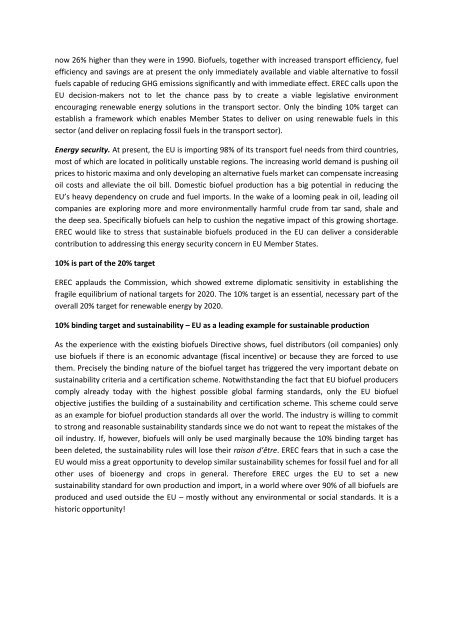
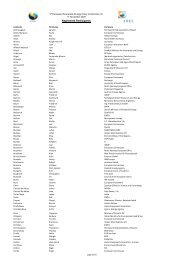
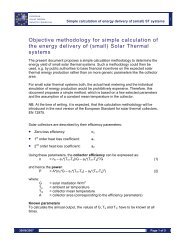
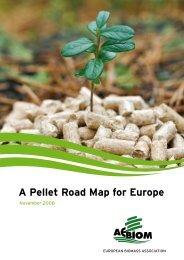
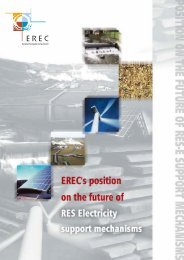
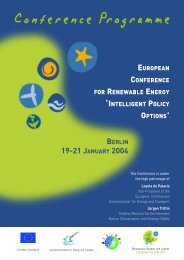
![Energy [R]evolution - Greenpeace](https://img.yumpu.com/47174859/1/184x260/energy-revolution-greenpeace.jpg?quality=85)
